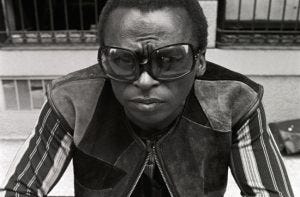Miles Davis: Birth of the Cool (2019)

I was first introduced to Miles Davis’ music when my college roommate put on the same album from which the title of this film was inspired, “Birth of the Cool” (an LP that was released by Capitol Records in 1957). My musical exploration has never really stopped since then, and I continued to discover other musical geniuses such as John Coltrane and Herbie Hancock who had also worked with Miles Davis during his career. It was this same curiosity about Miles Davis’ music that prompted me to watch the documentary Miles Davis: Birth of the Cool (henceforth referred to as MD: BOTC).
Remember the movie Collateral, with Tom Cruise and Jamie Foxx? Well, if you don’t, Tom Cruise plays a hitman-for-hire, and during his visit to Los Angeles to “eliminate” one of his targets, he encounters a musician who purported to know everything there was to know about Miles Davis. While talking with Tom Cruise’s character, he recounts a story about Miles Davis coming into a jazz club, explaining with such teary-eyed awe/sincerity the mystique of the musician and listing off a slew of adjectives to describe him. I reference this scene, because it was with this same familiarity and esteem that different musicians, family members, former lovers, wives, and friends tell the story of Miles Davis in MD:BOTC.
MD: BOTC starts with his upbringing in the 1920s, witnessing domestic violence in his household which may have impacted how he perceived women and relationships for the rest of his life. The viewer is given a glimpse into Davis’ introduction to music and follows him to his formal musical training at the Juilliard School in New York. Former collaborators, musicians, and producers explain how Davis’ music changed throughout the decades, morphing as the times progressed and as he grew as an artist. Davis’ experience with racial issues in America, drug/alcohol abuse, romantic relationships, and other facets of his life are told through rare photos, historical clips, never-before-seen archival footage, and Davis’ own music.
The raspy-voiced Carl Lumbly narrates the film in first-person, using quotes and historical details from Davis’ life. For my money, the growth and evolution of Miles Davis’ creativity was the most captivating part of the film. How he was able to revolutionize music and bring his ideas to the world truly do epitomize what it means to be original--to be cool. Being able to use music as a conduit through which he could express himself, communicate to his audience, and capture a particular mood, highlight what it means to be an artist. MD: BOTC gives context to his inspirations and the music itself.
MD: BOTC captures the high notes, the low notes, and the “in between” notes, which Davis explains, sometimes get you to the “right note.” Producer/Director Stanley Nelson has strung together a documentary that is seamlessly fluid, paralleling a winning formula that Davis frequently used when creating improvisational jazz albums.



